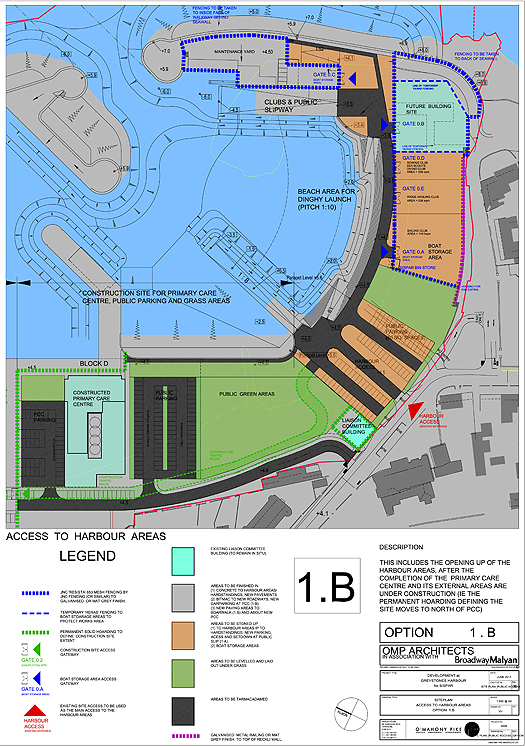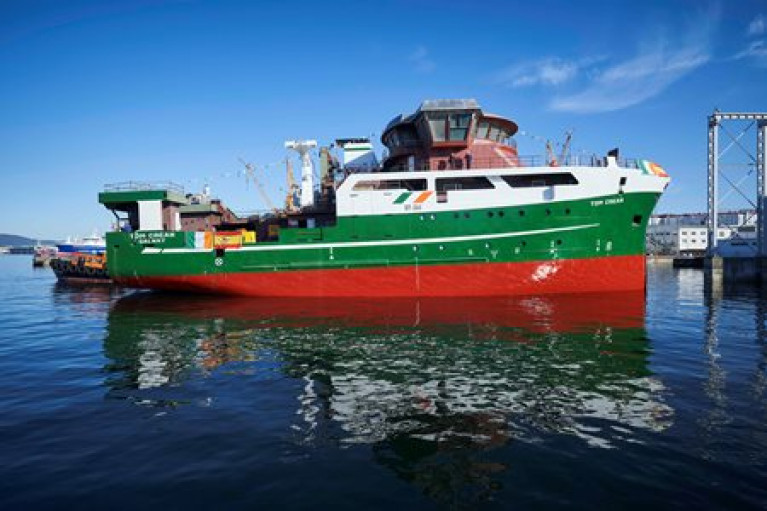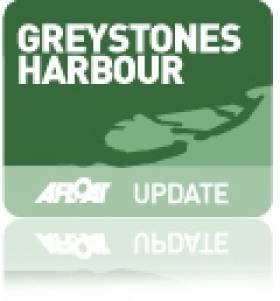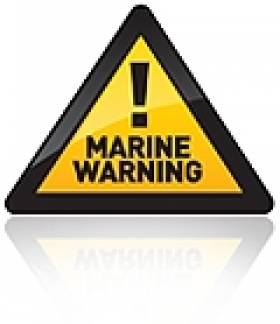Displaying items by tag: Launch
Despite grey clouds, the sun was out too during the launch of Arklow Rose this morning, which was a spectacle that the locals of a Dutch shipyard clearly enjoyed watching, writes Jehan Ashmore.
A blast from the Royal Bodewes shipyard launched the ship transversely into the waterway, generating consequential wash, which saw tugs fore and aft bob about. All this adds to the drama.
Arklow Rose is now the penultimate of seven 6,800 deadweight (dwt) tons (‘R’ class) to enter the waterway at the shipyard in Martenshoek. Like the rest of the series, it has a cargo hold capacity of 310.000 cubic feet and a service speed of 11 knots.
The 105-metre-long overall (LOA) vessel built for Arklow Shipping Ltd., marks another proud day for the Irish Ship Registrar, with the dry bulk cargo ship showing at its stern the east coast shipowner's homeport.
Also, at the stern (starboard quarter), can be seen the support frame structure where the free-fall lifeboat will occupy its cradle position.
This latest launch follows Arklow Resolve, which took place in January, and sea trials in the North Sea, which occurred in March, necessitating a tow of the newbuild from the inland yard to the Ems Estuary.
Arklow Rose takes its name from a previous vessel, which represented the first of 16 short-sea traders built from 2002. Likewise, the newbuilds were all Dutch-built but from the yard of Barkmeijer Strooboos. As Afloat reported, only two such ships of this series remain in service.
During the video(s) footage of Arklow Rose, when it pans to the left, note that in the bottom corner there is a superstructure showing the bridge and a funnel (on its side) with the ASL crest clearly visible.
This is invariably the final Eco-Trader of this series, which Afloat shall look forward to featuring.
RV Tom Crean: Ireland's Newbuild Marine Research Vessel Makes its First Splash In Spain
Ireland's new state-of-the-art marine research vessel, RV Tom Crean, was today launched as the hull went into the water for the first time from the Astilleros Armon shipyard in Vigo, Spain.
The launch of the hull is a significant milestone in the build process, with the Marine Institute's vessel on schedule to be completed in summer 2022. The build of the RV Tom Crean received funding of €25 million from the Department of Agriculture, Food and the Marine, as approved by the Government of Ireland.
Minister for Agriculture, Food and the Marine, Charlie McConalogue T.D., said,"I am pleased to note the significant progress being made to date on the construction of Ireland's new marine research vessel ' RV Tom Crean' and welcome this significant milestone in the construction project. This new research vessel (when delivered in 2022) will be an important infrastructural tool in acquiring data and information supporting the sustainable management and development of Irelands valuable marine resource. The vessel will support key national and international programmes in fish stock assessment, climate change related research, environmental monitoring, seabed mapping and marine spatial planning, supporting the implementation of the Common Fisheries Policy and delivery of the National Marine Planning Framework and other important marine related activities."
His Excellency Frank Smyth, Ambassador of Ireland to Spain and Andorra, joined Marine Institute Chairman Dr John Killeen and Interim CEO Michael Gillooly to view the hull of the 52.8 metre vessel glide into the water.
Michael Gillooly, Interim CEO of the Marine Institute said, "It is remarkable to see the launch of the hull of the RV Tom Crean today, which marks an important stage in the construction of this modern, multipurpose vessel. It will carry out a wide range of marine research activities including expanded fisheries surveys, seabed mapping and marine spatial planning, climate change related research, environmental monitoring, deep water surveys, and support increased research in the Atlantic Ocean. The RV Tom Crean will enable the Marine Institute to continue to lead and support vital scientific surveys that contribute to Ireland's position as a leader in marine science."RV Tom Crean at Astilleros Armon shipyard in Vigo, Spain
The RV Tom Crean, which will replace the 31 metre RV Celtic Voyager, will provide a year round service, enabling 300 operational days at sea each year, and up to 3,000 scientist days of research per year.
The new research vessel will be a silent vessel, capable of operating throughout the Irish Exclusive Economic Zone (EEZ). The RV Tom Crean will be able to go to sea for at least 21 days at a time and is designed to operate in harsh sea conditions.
Based in Galway, the vessel will be used by the Marine Institute, other state agencies and universities to undertake multidisciplinary surveys. It will also maintain and deploy weather buoys, observational infrastructure and our Remotely Operated Vehicle (ROV) Holland I.
As Afloat reported in Janaury, Ireland's new marine research vessel has been named the RV Tom Crean, after the renowned (Kerry) seaman and explorer who undertook three major ground breaking expeditions to the Antarctic in the early years of the 20th Century; which sought to increase scientific knowledge and to explore unreached areas of the world, at that time.
Spanish shipyard Astilleros Armon Vigo S.A. were awarded the contract to build Ireland's new state-of-the-art marine research vessel in 2019, following the completion of the design by Norwegian ship design consultants Skipsteknisk AS. The construction of the new national research vessel continues on schedule and on budget in 2021.
Irish Ferries W.B. Yeats to be Launched at German Shipyard Tomorrow
#FerryNews - Weather permitting, Irish Continental Group (ICG)’s €144m newbuild cruiseferry W.B. Yeats, is due to be launched tomorrow from a German shipyard, writes Jehan Ashmore.
The giant 55,500 gross tonnage W.B. Yeats with a capacity for 1,885 passengers and crew and 1,200 cars, is to be launched from the slip of Flensburger Schiffbau-Gesellschaft mbH & Co. KG (FSG).
Launching of W.B. Yeats will be a significant milestone for ICG as the cruiseferry will easily be the biggest ever to enter service for their ferry division Irish Ferries, however this will be upstaged by an even larger giant super-cruiseferry, as ICG recently placed an order also with FSG at a cost of €165.2m.
The super cruiseferry, estimated to be around 67,300 gross tonnage, is to be delivered by mid-2020 and operate the core Irish Sea Dublin-Holyhead route. The super-cruisferry will be more freight-orientated and will also be the biggest ferry in the world in terms of vehicle capacity.
As for the W.B. Yeats, tomorrow's first contact of the cruise ferry with the water at the FSG shipyard is located in the German city on the Baltic Sea.
There remains plenty of work to be done as the luxurious cruiseferry will take several months before shipbuilders sea trials of W.B. Yeats can take place. In addition to berthing trials in mid-June following W. B. Yeats scheduled delivery voyage to Dublin Port. The cruiseferry at 195m is longer to the capital's iconic ‘Spire’ if laid on its side which measures just 120m.
Dublin Port is homeport to ICG headquarters and where existing flagship, Ulysses operates on the route to Holyhead. The 50,000 gross tonnage cruiseferry built by Aker Finnyards, Finland in 2001, bears a strong design resemblance to that of W.B. Yeats.
Irish Ferries are firstly to deploy W.B. Yeats on an Ireland-France around mid-July, this will be the Dublin-Cherbourg route. The new cruiseferry is to enter service ready in time for the summer's high-season months.
The continental route opened in recent years by the chartered-in ropax Epsilon, offering a no-frills service, is to be replaced by the W.B. Yeats which will be a considerable improvement given the extensive range of passenger facilities. They include a Club Class lounge, an á la carte and self-service restaurants, cinema, shopping mall and a variety of bars and choice of lounges.
W.B. Yeats will also raise the bar as accommodation for 440 cabins will include luxury suites with their own private balconies. This feature is a first for Irish Ferries and will be appreciated more so during the summer and on the longer continental crossings. This compared to the short-sea Dublin-Holyhead route, when W.B. Yeats is to make a second new debut by serving on the Welsh service from September.
At that stage, it will be a year since the cruiseferry’s official keel-laying ceremony took place at FSG. The Flensburg shipyard will be kept busy with construction of the ‘jumboised’ version of W.B. Yeats half-sister super-cruiseferry, given designs seen by Afloat which will be revealed soon on FerryNews.
'Stolen' National Yacht Club Launch Wrecked in Gale
A much loved club launch belonging to the National Yacht Club in Dun Laoghaire has been wrecked in southerly gales on Dublin Bay. It follows the reported theft of the launch at the weekend that subsequently became the subject of a search and rescue operation when the vessel became entangled in lobster pots in nearby Scotsman's Bay.
The 20–foot boat that ferried club members to and from yacht moorings was wrecked at the back of the pier before the club could retrieve it.
Read our earlier story on the NYC launch rescue here
The 'best public boat launching facilities in Ireland' will be provided in a final Greystones Harbour Plan released today, according to Fine Gael Concillor Derek Mitchell.
Having consulted with the community Sispar has produced their final plan for the Harbour for September and are currently implementing it, the Councillor says.
'This provides the best public boat launching facilities in Ireland even in this temporary solution. There is also good walking access to the area and South Pier together with car parking and green areas. To construct the Health Centre safely the hoardings at the North end will remain but the large green area there should open in a year, Mitchell, a winner in the Ruffian class in last week's VDLR sailing regatta, told Afloat.ie


Drawings showing the proposed public access arrangements at Greystones Harbour. For higher resolution versions the pdf's are attached below.
'I am pleased they are implementing most of my plan and opposed to more meetings which will only delay implementation', he added.
Surveyors Issue Boat Launch Warning
Boat owners are being warned of of the lasting consequences of the winter's big freeze and the possible damage to boats on launching this season.
At the most recent meeting of the Irish Branch of the International Institute for Marine Surveying members highlighted a real danger of some boats sinking shortly after being launched due to cracked pipe work on intakes and discharges where fresh water was not drained from cooling and other systems.
Owners and Boat yard employees are reminded to check carefully all pipe work prior to launching boats and immediately when the boat enters the water. Check that all valves are operating correctly. Complete a full check for leaks and monitor the bilge water during the first few hours when the boat has been re-launched.
Engine blocks should also be checked for frost damage prior to staring them. Do not start them if you see fractures, have the engine checked by a marine mechanic if in any doubt whatsoever. Batteries may also be dead and need of replacement due to the severe weather experienced over the Winter months.
































































